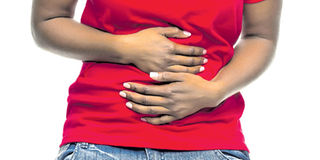Peptic ulcers: causes and symptoms

The most common peptic ulcer symptom is burning stomach pain. Stomach acid makes the pain worse, as does having an empty stomach. The pain can often be relieved by eating certain foods that buffer stomach acid or by taking an acid-reducing medication.
PHOTO |FILE.
What you need to know:
Peptic Ulcers are sores that tend to appear in the lining of your stomach or the first part of the small intestine (the duodenum).
Peptic Ulcers are sores that tend to appear in the lining of your stomach or the first part of the small intestine (the duodenum).
At times, there is an imbalance of fluids at specific regions in your body’s digestive system and this is how the sores may begin to develop, giving rise to two forms of ulcers—stomach and duodenal ulcers.
There is also a rare case of what we call esophageal ulcers. Mostly, this may develop as result of a bacterial infection known as helicobacter pylori (H.pylori).
Things that put you at risk
First, is the use of painkillers, medically known as Non Steroid Anti-inflammatory Drugs (NSAIDs). These drugs tend to damage the lining of the stomach and duodenum.
The other common causes, like I pointed out earlier, are bacteria. Helicobacter pylori are the bacteria notorious for this condition.
Such bacteria live in the layer that covers and protects the tissues that line the stomach and the small intestine. What the bacteria do is to cause inflammation of the inner layer of the stomach and small intestine, hence causing an ulcer.
Other medications. Taking certain medications together with the pain killers I earlier said, the NSAIDs, can greatly increase the risk of developing ulcers.
Doctors will always advise on this, and for patients it’s usually important to adhere when a medic instructs you not to take the painkillers along the medications.
Lifestyles to avoid
Heavy smoking of cigarettes promotes the development of ulcers in a number of ways. It tends to increase the acidity of the duodenum and makes it vulnerable to the H.Pylori infection.
Smoking: This constricts the blood vessels of the stomach thereby reducing the blood flow. This tends to damage the stomach tissues and slows down the healing of the ulcer.
But also, cigarette smoking suppresses the production of natural substances that protect the stomach and duodenum from tissue damage. But most of the effects tend to decline after stopping to smoke but worsens more with continuous smoking.
Stress: This is also known as stress-related mucosal injury of the stomach. Radiation treatment to the region, with a high dose of radiations. Usually, the experts in radiation treatment are careful about this.
How to know a person has peptic ulcers
Patients with peptic ulcers tend to have the following symptoms, such as a burning stomach pain between meals or at night.
They will complain of bloating with fullness of the abdomen that tends to make one uncomfortable. Then, a patient will experience heartburn, intolerance to fatty food, nausea and vomiting; and unexplained weight loss. The patient will have indigestion together with loss of appetite.
In severe cases, a patient with peptic ulcers will report to have spotted dark or black stools. This is usually caused by a bleeding ulcer; Doctors call this condition “melena.” The patient will vomit blood or something looking like ground coffee and severe pain in the belly.
What happens if ulcers are left untreated?
There are several complications that tend to occur when peptic ulcers are left untreated. The first is internal bleeding. A bleeding ulcer tends to cause slow bleeding that may progress to anemia. In cases of severe blood loss, this may require hospitalisation or a blood transfusion.
Black or blood vomitus may be associated with severe loss of blood, which may also cause black or bloody stool. There is also a risk of infection. Peptic ulcers can perforate the wall of the small intestine putting one at risk of severe infection in the abdomen (peritonitis).
Then, at one point there might be obstruction. This arises due to swelling, inflammation or scarring that may block passage of food through the digestive tract.A blockage may make your stomach become full easily, vomit and lose weight.
Is there any likelihood of stomach cancer?
Yes. For stomach cancer, this is six times more likely in those patients with H. pylori infection compared to those with no infection. When the ulcers have become more complicated, they can penetrate the wall of the digestive tract and eventually affect other organs like the pancreas.
Can the condition be treated?
Yes. Treatment is broadly divided into surgical and non-surgical. Non-surgical treatment involves the use of medications to heal the ulcer but surgical treatment is performed in very rare cases where the ulcer doesn’t heal, bleeds tear via the stomach.
Surgery may include removal of the entire ulcer by taking tissue from another part of the intestine and patching it over the site of the ulcer, tie off the bleeding vessels like arteries and cutting off the nerve supply to the stomach to reduce the production of stomach acid.
Preventing regular use of non-steroids anti-inflammatory drugs (NSAIDs), together with the medications that your doctor may advise against.
Email: [email protected]




